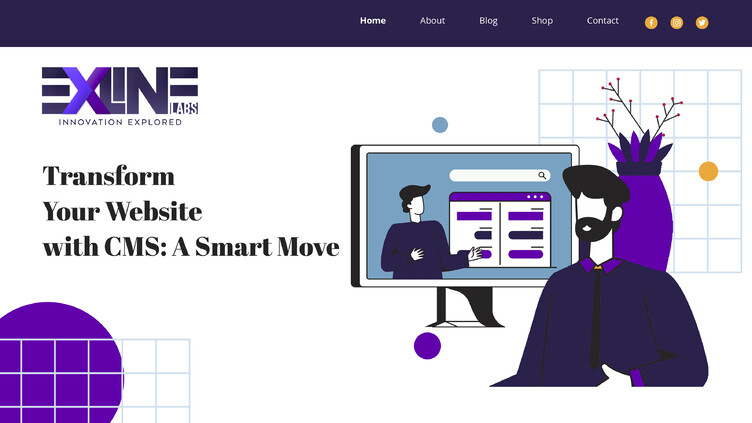A content management system (CMS) is a web-based application that allows website owners to easily manage and organize their content without the need for technical expertise. CMS is a powerful tool for creating and maintaining websites and can help you transform your online presence. In this article, we’ll discuss different types of CMS, their usages, and examples.
Types of CMS
1) Open-source CMS
Open-source CMS is a free and open-source software that allows users to modify, distribute, and enhance the system’s source code. These CMS platforms are often community-driven, and users can rely on a vast community of developers to contribute code, plugins, and themes. Examples of open-source CMS include WordPress, Joomla, and Drupal.
From a technical perspective, open-source CMS platforms provide website owners with greater flexibility to customize their website. Developers can modify the source code to create custom features, or integrate third-party plugins to extend the functionality of the website. Open-source CMS platforms also allow website owners to modify the design and layout of their website by editing the HTML, CSS, and JavaScript files.
2) Proprietary CMS
Proprietary CMS is a closed-source software that requires a license to use. These CMS platforms are often developed by companies, and users must pay for licensing and technical support. Examples of proprietary CMS include Adobe Experience Manager, Sitecore, and Kentico.
Proprietary CMS platforms provide users with a more secure and stable platform, as the code is not freely available to the public. Proprietary CMS platforms also provide technical support and training, making it easier for non-technical users to manage their website. However, proprietary CMS platforms are less customizable than open-source CMS, as users are limited to the features and plugins provided by the company.
3) Cloud-based CMS
Cloud-based CMS is a web-based application that is hosted on a remote server, allowing users to access it through a web browser. These CMS platforms often come with pre-built templates and drag-and-drop editors, making them easy to use for non-technical users. Examples of cloud-based CMS include Wix, Squarespace, and Shopify.
From a technical perspective, cloud-based CMS platforms provide users with a scalable and reliable platform, as the platform is hosted on a remote server. Cloud-based CMS platforms also provide automatic updates and backups, reducing the risk of website downtime or data loss. However, cloud-based CMS platforms may be less customizable than open-source or proprietary CMS, as users are limited to the features provided by the platform.
Usages of CMS
1) Content creation and management
One of the primary uses of CMS is content creation and management. CMS platforms provide users with tools to create and manage content, including text, images, and videos. CMS allows users to create, edit, and publish content without requiring technical knowledge.
CMS platforms often come with built-in text editors and media libraries that allow website owners to easily add and manage content. Some CMS platforms also come with workflow and collaboration tools that allow multiple users to work on the same content.
2) Website design and customization
CMS platforms often come with pre-built templates and themes that users can use to design their website. Users can also customize these templates by changing the color, font, and layout of the website. CMS makes website design and customization easy for non-technical users.
Developers can also create custom templates and themes for CMS platforms, allowing website owners to create a unique and branded website design. Some CMS platforms also come with page builders and drag-and-drop editors that allow users to easily create and edit web pages.
3) Search engine optimization (SEO)
CMS platforms often come with built-in SEO features that help website owners optimize their content for search engines. CMS can help website owners improve their website’s search engine ranking by providing tools to optimize meta tags, URLs, and content.
Developers can also create custom SEO plugins and add-ons for CMS platforms that provide advanced SEO functionality. Some CMS platforms also come with integrations with external SEO tools, such as Google Analytics and Google Search Console, to provide even more insights into website performance.
Examples of CMS
1) WordPress
WordPress is a free and open-source CMS platform that powers over 40% of all websites on the internet. WordPress is known for its flexibility, customizability, and vast community of developers. It comes with a large number of plugins and themes that allow users to easily add new features and design elements to their website.
WordPress is often used for blogging, e-commerce, and news websites. It has a large number of SEO plugins, making it an ideal choice for websites looking to improve their search engine rankings.
2) Shopify
Shopify is a cloud-based CMS platform that is designed for e-commerce websites. It comes with a wide range of e-commerce features, such as shopping cart, payment gateway integrations, and inventory management. Shopify is known for its ease of use, making it an ideal choice for non-technical users.
Shopify is often used for small and medium-sized e-commerce websites. It has a large number of pre-built templates and themes that users can use to design their website. Shopify also comes with a large number of third-party apps that allow users to add new features and functionality to their website.
3) Adobe Experience Manager
Adobe Experience Manager is a proprietary CMS platform that is designed for large enterprises and organizations. It comes with a wide range of features, such as workflow management, digital asset management, and marketing automation. Adobe Experience Manager is known for its advanced features and integrations, making it an ideal choice for businesses that require a high level of customization and support.
Adobe Experience Manager is often used for large e-commerce websites, news websites, and government websites. It comes with a large number of integrations with Adobe’s other products, such as Photoshop, InDesign, and Illustrator.
Conclusion
CMS is a powerful tool for creating and managing websites. It provides website owners with the flexibility and customization they need to create a unique online presence. With the variety of CMS platforms available, website owners can choose the one that best suits their needs and budget. Whether you’re a small business owner or a large enterprise, CMS can help you transform your website into a powerful and effective online platform.
Ready to transform your online presence and harness the power of a content management system (CMS)? Whether you’re a small business owner or a large enterprise, a CMS can revolutionize the way you create, manage, and customize your website. With options ranging from open-source platforms like WordPress to cloud-based solutions like Shopify, you have the flexibility to choose the CMS that aligns with your needs and goals. Don’t miss out on the opportunity to enhance your website’s design, content management, and search engine optimization. Contact us today to explore how a CMS can elevate your digital strategy. Our team at Exline Labs is here to guide you through the world of CMS and empower you to build a powerful and effective online platform.

